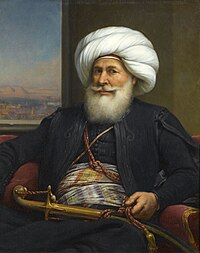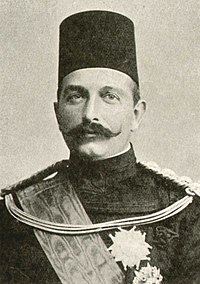Khedive

Khedive (
It is attested in Persian poetry from the 10th century and was used as an Ottoman honorific from the 16th. It was borrowed into Ottoman Turkish directly from Persian.[1] It was first used in Egypt, without official recognition, by Muhammad Ali Pasha, the ethnically Albanian governor of Ottoman Egypt and Turco-Egyptian Sudan from 1805 to 1848. The initially self-declared title was officially recognized by the Ottoman government in 1867 and used subsequently by Isma'il Pasha of Egypt and his dynastic successors until 1914.[2] The term entered Arabic in Egypt in the 1850s.[1]
Etymology
This title is recorded in English since 1867, borrowed from French khédive, in turn from Ottoman Turkish خدیو hıdiv, from Classical Persian خدیو khidēv ("lord").[2]
Egypt in the 19th and early 20th centuries
Wilāyah (1805–1867)
Following the
Khedivate (1867–1914)

The
After the nationalist
Abbas II of Egypt was deposed by the British in 1914, and Egypt was declared a protectorate of Britain, the Sultanate of Egypt, which was ruled by Abbas's uncle Hussein Kamel under the title of Sultan.
References
- ^ a b c Adam Mestyan, "Khedive", Encyclopaedia of Islam, Three (Leiden: Brill, 2020), 2:70–71.
- ^ a b c d Encyclopædia Britannica: Ismail Pasha, Ottoman Viceroy of Egypt
- ^ Historic photo of the Khedive Ismail Pasha Palace (Hıdiv İsmail Paşa Sarayı) which once stood in the Emirgan neighbourhood of Istanbul, on the European coast of the Bosphorus.
External links
- Mestyan, Adam (2020). "Khedive". In Fleet, Kate; Krämer, Gudrun; Matringe, Denis; Nawas, John; Rowson, Everett (eds.). Encyclopaedia of Islam (3rd ed.). Brill Online. ISSN 1873-9830.
- Etymonline
